As a child I loved magic tricks. One day as we watched a magician on TV, my father pointed out that the most important thing isn’t the magic. It’s the trick. It’s not what you see. It’s how you are skilfully distracted. Another name for magicians, he said, is “illusionists”.
After covering election campaigns around the world, my father’s observation about magicians often seems true of politicians. A political campaign is often in part an illusion, the politics of distraction.
What is largely hidden now in the UK general election campaign, or rarely discussed, is just as revealing as the televised political theatre. Last year, the British Office for National Statistics pointed to the largely unchanging list of policies and issues people care about: “When asked about the important issues facing the UK today, the most commonly reported issues continue to be the cost of living [93 per cent], the National Health Service [89 per cent], the economy [76 per cent], and climate change and the environment [59 per cent].”
What is sometimes more revealing are those issues that everyone knows exist but few politicians want to talk about. War is one. It’s too shocking and depressing. From Gaza to Ukraine to the complex relationship between China and the US, there is real concern in diplomatic and security circles that we have moved from a post-war world towards a pre-war world. Both major British parties, Labour and Conservatives, say they will spend more on defence, but neither wish to engage in what could be a very problematic second Donald Trump term for Nato, European security and US-China relations.

Labour and Conservatives also tend nervously to avoid Brexit. In TV debates – with the exception of the dogged Scottish National Party politician Stephen Flynn – most contributors tend to duck the issue.
For the Conservatives, that’s because Brexit is their 21st-century historic failure. It has divided and haunted them as the Corn Laws – tariffs and other trade restrictions on imported food and corn – did from 1815 until their repeal in 1846. A majority of British people now recognise Brexit as a self-inflicted profound mistake. The diminishing band of Brexit enthusiasts blame the Conservatives for “not doing it right”, although – rather like communism – it may be that Brexit is an ideology like Marxism, in the sense that the theory was always doomed to fail in practice.
Many Brexit diehards have drifted off to an upstart new party, Reform UK. It’s the latest vehicle for the ambitions of the long-time anti-EU activist Nigel Farage following the collapse of his previous parties, UK Independence Party and the Brexit Party. Mr Farage is now running to be an MP again, having been rejected by voters for a Westminster seat a remarkable seven times. Perhaps eighth time lucky?
Labour’s reticence about Brexit is more strategic. If it wins the general election, it will have to repair the damage. There is no easy way forward, and in the meantime, it practises Brexit omerta where possible. That’s because Labour desperately wants to win back working-class voters who supported Brexit in the 2016 referendum, and it’s unwise to tell target voters they got it all wrong eight years ago.
The reason the SNP likes to point out the Brexit illusion, however, is also obvious. Scotland voted to stay in the EU. England voted to Leave. The SNP argues that Brexit proves the need for Scottish independence because Scotland was taken out of Europe “by English votes”.
And so right now, we have all the poetry and magical incantations of an election campaign while aware that Britain will return to the prosaic reality of the hard facts about Brexit and national security in a few weeks. And, curiously, the same magical incantations are true of another issue – perhaps the biggest – which underpins all the others: taxation.
Tax policy and the size of the state are discussions in every political campaign, but right now this vital debate is yet another strategic policy of distraction on both sides. The Conservative party raised taxes, yet now as in every election in memory, Conservatives portray Labour as planning to raise taxes on “hard working people”. Labour is always defensive on this. It promises in 2024 more or less what Tony Blair promised in 1997, to wait for more magic, the magic of economic growth, to fill government coffers with money.
Behind the illusions, the simple truth is that since the financial crisis, and especially since 2010, the public sector in the UK has shrunk. It has been defunded and undermined. Nothing therefore much works, from our health service and railways to our shrunken defence forces, our state schools, troubled universities and water supplies to our potholed roads and infrastructure.
There is no magic money tree to fund these public services. There is only taxation. Whatever the illusionists say, and whatever the magical incantations and hocus pocus, the simple political truth is that in a modern European economy you can have good public services or you can have low taxes. You can also have vast private wealth and public squalor.
This is not magic. It is arithmetic. And as my father pointed out, the important bit is not belief in magic. It’s seeing the trick.







